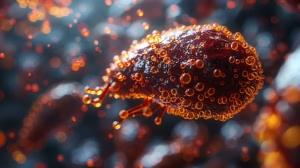 Primary sclerosing cholangitis (PSC) is a progressive liver disease with no FDA-approved treatments. The phase II SPRING study (NCT04595825) assessed the safety, tolerability and activity of the anti-human CCL24 monoclonal antibody CM-101 in adults with PSC over 48 weeks.1 In this interview, Dr Paul Pockros (Director, Liver Disease Center Scripps Clinic; Director of SC Liver Research Consortium LLC, La Jolla, CA, USA) discusses the challenges in diagnosing and managing PSC, the rationale for investigating CM-101 in this indication, and the SPRING study design and findings.
Primary sclerosing cholangitis (PSC) is a progressive liver disease with no FDA-approved treatments. The phase II SPRING study (NCT04595825) assessed the safety, tolerability and activity of the anti-human CCL24 monoclonal antibody CM-101 in adults with PSC over 48 weeks.1 In this interview, Dr Paul Pockros (Director, Liver Disease Center Scripps Clinic; Director of SC Liver Research Consortium LLC, La Jolla, CA, USA) discusses the challenges in diagnosing and managing PSC, the rationale for investigating CM-101 in this indication, and the SPRING study design and findings.
The abstract “CM-101, a novel monoclonal antibody targeting CCL24, was safe, well-tolerated and showed improvements of biomarkers associated with inflammation, fibrosis and cholestasis in patients with primary sclerosing cholangitis (PSC): The Spring Study.” was presented at Digestive Disease Week 2025, San Diego, CA, USA; May 3–6, 2025.
Q. What challenges are associated with the diagnosis and management of PSC?
PSC has an unknown etiology but is associated with inflammatory bowel disease (IBD) in ~70% of cases. PSC is characterized by inflammation and fibrotic strictures of the bile ducts, and complications include cirrhosis, cholangitis, and cholangiocarcinoma. PSC also confers high risk for colon cancer in patients with IBD. Median transplant-free survival is ~20 years and currently there are no FDA-approved therapies.
Q. What is the mechanism of action of CM-101 and what was the rationale for targeting CCL24?
CM-101 targets and inhibits CCL24; CCL24 is a chemokine that promotes cell trafficking and regulates inflammatory and fibrotic activities through the CCR3 receptor. CCL24 expression is significantly and selectively elevated in PSC livers and elevated serum CCL24 levels are higher in patients with cirrhosis.
Q. Could you give us a brief overview of the aims and trial design of the Spring Study?
Key enrollment criteria included PSC patients with large duct disease of >24 weeks duration, alkaline phosphatase level more than 1.5 times the upper limit of normal, stable IBD and stable ursodeoxycholic acid (UDCA) treatment was allowed. The primary outcome measures were safety and tolerability. The secondary outcome measures were change from baseline to week 15 in: liver stiffness by vibration-controlled transient elastography (VCTE, e.g., FibroScan®); enhanced liver fibrosis (ELF) score; fibrogenesis biomarker (Pro-C3); pruritus; liver enzymes (ALP, ALT, AST, GGT) and total bilirubin; pharmacokinetic and pharmacodynamic parameters. There was a prespecified analysis of all patients with VCTE >8.7kPa. Territories included the US, UK, Germany, Spain, and Israel.
Q. What were the key findings and conclusions from the study?
In the double-blind trial, CM-101 was well tolerated and had a safety profile comparable to placebo. CM-101 demonstrated dose dependent, anti-inflammatory, anti-fibrotic, and anti-cholestatic effects in patients with PSC. In a pre-specified subgroup of patients with moderate to advanced disease, patients treated with CM-101 showed broad and consistent improvement in biomarkers associated with clinical outcomes. In the open-label extension, CM-101 was safe and well-tolerated for up to 48 weeks of treatment and showed sustained or continual improvement in markers of fibrosis. Furthermore there was sustained and continual reduction in ELF score, especially in patients with moderate/advanced disease receiving CM-101 20mg/kg and a stabilization of liver stiffness as measured by VCTE, especially in patients with moderate/advanced disease receiving CM-101 20mg/kg.
Q. What could these findings mean for the treatment of other inflammatory conditions?
These findings support developing CM-101 20mg/kg in a phase 3 clinical study in patients with PSC. It is unclear if there would be any benefit to other inflammatory conditions.
References
- Clinicaltrials.gov. CM-101 in PSC Patients -The SPRING Study. ClinicalTrials.gov identifier: NCT04595825. Available at: https://clinicaltrials.gov/study/NCT04595825 (accessed 8 May 2025).
- CL Bowlus, ST Barclay, D Joshi, et al on behalf of the SPRING Study Investigators. CM-101, a novel monoclonal antibody targeting CCL24, was safe, well-tolerated and showed improvements of biomarkers associated with inflammation, fibrosis and cholestasis in patients with primary sclerosing cholangitis: the SPRING study. Presented at: DDW 2025, San Diego, 4 May, 2025.
Further content in liver disorders.
Editor: Victoria Jones, Senior Content Editor.
Cite: Paul Pockros. Findings from the Spring Study, an Investigation of CM-101 for Primary Sclerosing Cholangitis: Paul Pockros, DDW 2025. touchIMMUNOLOGY. May 2025.
Disclosures: This short article was prepared by touchIMMUNOLOGY in collaboration with Dr Paul Pockros. touchIMMUNOLOGY utilize AI as an editorial tool (ChatGPT (GPT-4o) [Large language model]. https://chat.openai.com/chat.) The content was developed and edited by human editors. No fees or funding were associated with its publication.
SIGN UP to TouchIMMUNOLOGY!
Join our global community today for access to thousands of peer-reviewed articles, expert insights, and learn-on-the-go education across 150+ specialties, plus concise email updates and newsletters so you never miss out.






